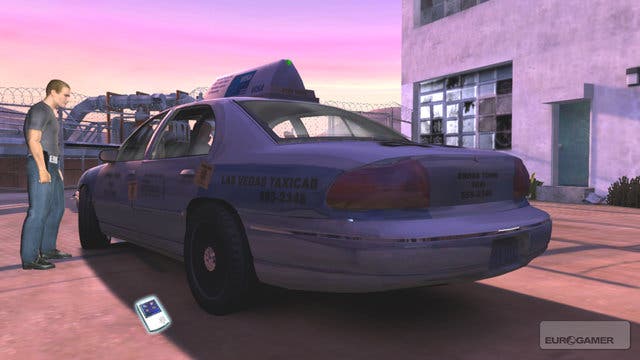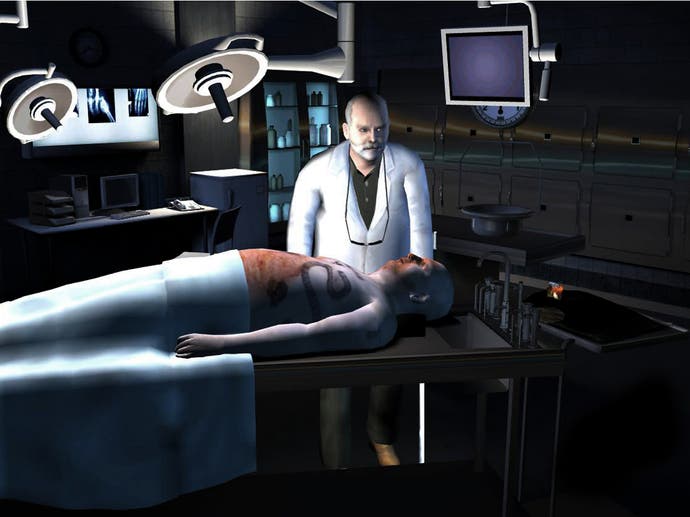CSI: Crime Scene Investigation - Hard Evidence
Scant evidence of quality.
Questions answers! Answers question?
At that point you'll have identified new people to question, and new questions to ask those who you've already connected to the crime scene - it's a pattern that repeats itself throughout each case. So, you'll talk to the coroner, ask him a bunch of pre-determined questions, pick up the items belonging to the deceased, analyse that for clues and go through the process again, each time finding a little more to connect the various suspects to the murder enquiry. With each increment of progress, the game will unlock a little more of itself, such as allowing you to ask for a search warrant of a suspect's residence, or to eventually bring them in for questioning. Every time you hit a dead-end, it's usually a cue to go around and either talk to everyone again, search for some more evidence (that you may have overlooked), or do some more lab work. Failing that, you can always ask your all-knowing assistant. He's good like that.
In terms of the basic mechanics of the game, it's not bad at all once you get beyond the 1999-era character models that greet you at every turn. The dialogue's generally well scripted (in a bland TV cop show kind of way) and reasonably proficiently voice-acted, so that's a big tick right there. Also, after a slow start, the way each case unfolds becomes curiously moreish, especially once you suss out the simple, refined interface.
That said, some components of the game are so hilarious low-budget and clunky that it detracts significantly from the enjoyment - such as the way the game doesn't allow you to move around the crime scene freely in 3D, preferring an appallingly limited system of on-rails movement (not dissimilar to, gasp, The 7th Guest from 1993) where you can 'guide' yourself around the location by moving the cursor in a direction the game allows you. If the game lets you point the camera in that direction, it rotates or pans around the scene, also allowing you to zoom in on a specific part of the environment. To begin with it feels, frankly, horrible, and so outdated and ponderous to play to make the game feel unacceptably behind the times in a fairly fundamental way. To give Telltale its dues, you can see why it opted for an on-rails system, because it actually does make the process of searching for clues a little more straightforward, but it's an inelegant solution nevertheless. After a while, other elements of the game, like dealing with evidence and grilling suspects, go some way towards making up for the clunky mess that is evidence gathering, but even those aren't exactly stylishly executed.

The conversation system is about as basic as you can get, with a set stock of questions, and absolutely no degree of choice in what you ask them, how you approach your questioning (softly softly, sarcastic, or just playing hardball). It's like Monkey Island never happened. Fair enough, branching conversation trees and dead-ends might needlessly pad out the game, or effect the outcome in a convoluted and negative way, but at least you'd feel like you were vaguely trying to use your powers of interrogation, rather than just asking one or two stock questions prescribed when you link their DNA to something found at the crime scene.
And it's just as well as there is a built-in hint system, because otherwise you'd end up furiously frustrated at being held up because of one simple action - usually something irritating like not having gone back to question everyone again, or finding out that the next time you go back to a location an item of evidence (previously not considered important) is suddenly now of pivotal interest. Grrr. The amount of repetition in the questioning, and the sheer number of times you keep having to go back to your suspects starts to grate after a while. You find yourself asking for a hint just so you can just move the damn thing on - without them, you could conceivably find yourself wondering if you really had scoured every location for every piece of evidence - at least that element of doubt can be swiftly removed, but the mere fact the game has the hint system is a sign that it's a game that desperately needs it, and is therefore slightly broken by design.

It's not an especially hard game, though; it's just one that demands you to be exceptionally thorough to a degree that doesn't always make for a fun gaming experience. Once you see through the formula of what CSI expects from you, it does remove some of the abject clunkiness of it all, and things that may have proved frustrating to begin with become less so. After a while you might even begin to zone out from how absolutely awful the graphics are, and just enjoy picking your way through like an obsessive compulsive. But all too often there are a host of jarring reminders of how flawed this game is, and how much potential the concept has if Telltale had been given the time and investment onto doing a proper job (but, hey, if it pays their bills to make more Sam & Max, fine).
Ubisoft chose the right developer, but clearly it's a game which wasn't very high up on the publisher's list of priorities in terms of investing in it, and it shows. If you're a die-hard adventure apologist with a CSI fixation then step right up, but the rest of you can put your curiosity to one side - especially at its current stupidly high price point.








